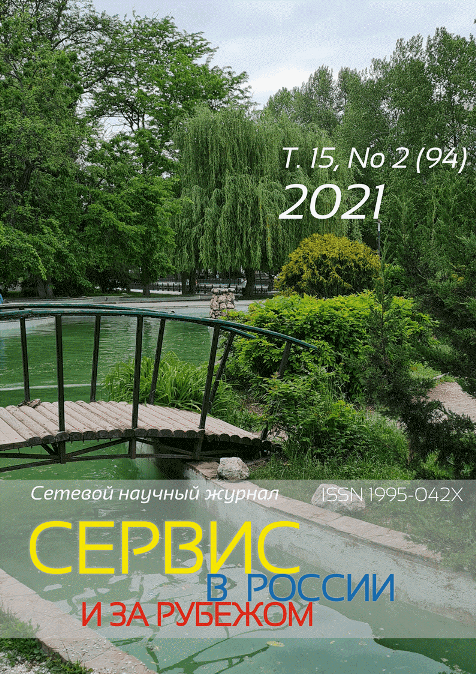Slum tourism as an alternative form of travel: methodological issues and successful practices
DOI:
https://doi.org/10.24412/1995-042X-2021-2-17-29Keywords:
slum tourism, reality tourism, favela tourism, slums, alternative tourismAbstract
The article is devoted to the issues of slum tourism – one of the most controversial and complex phenomena in tourism practice. The demand for slum tourism is driven by tourists’ interest in unusual, vivid, unforgettable emotions and impressions, including negative ones. However, the emergence of slum tourism was less about entertainment and more about understanding the problems of dominant regimes, poverty and hunger. Slum tourism involves visiting poor areas with chaotic buildings, where there is a shortage of drinking water and basic living conditions. At the same time, variety of type and forms of slums, ways of organizing travel, tourist motivation gives rise to many practices but complicates the theorization of slum tourism as a phenomenon. The article provides a review of scientific publications, identifies the views of Russian and foreign scientists on the concept of slum tourism, and presents successful cases. The authors study the existing slum tours and analyze the satisfaction and motivation of tourists who visited them. Based on the study of scientific views, successful practices and motivation of travelers, the article attempts to classify slum tourism activities. The article draws several methodological conclusions about the phenomenon of slum tourism, and also considers the possibility of its implementation in Russia.
Downloads
References
Белякова М.Ю., Кехайрова М. Некоторые аспекты туризма трущоб в мире // Московский экономический журнал. 2020. №5. С. 814-826.
Малетин С.С. Трущобы как туристская дестинация // Вестник КемГУ. 2015. №2-7 (62). С. 42-46.
Осипова М.С. Фавела-туризм как альтернативное туристическое направление в Рио-де-Жанейро // Сборник статей XIV большого географического фестиваля. 2018. С. 1127-1132.
Anbinder T. Five Points: The 19th-century New York City Neighborhood that Invented Tap Dance, Stole Elections, and Became the World’s Most Notorious Slum. New York: Free Press, 2001.
Conforti J. Ghettos as tourism attractions // Annals of Tourism Research. 1996. Iss. 23(4). P. 830.
Dowling R.M. Slumming in New York: From the Waterfront to Mythic Harlem Reprint. University of Illinois Press, 2009.
de Araújo A.F., Vieira A.L., Costa C. Developing a Model of Film-Induced Slum Tourism Motivations: an Exploratory, Qualitative Approach // The Proceedings of the 13th European Conference on Innovation and Entrepreneurship, Reading (UK). 2018. P. 50-58.
Dyson P. Slum tourism: Representing and interpreting ‘reality’ in Dharavi, Mumbai // Tourism Geographies. 2012. Iss. 14(2). Pp. 254–274.
Freire-Medeiros B. The favela and its touristic transits // Geoforum. 2009. Vol.40. Iss.4. Pp. 580–588.
Frenzel F., Koens K. Slum Tourism: Developments in a Young Field of Interdisciplinary Tourism Research // Tourism Geographies. 2012. Vol.14. Iss.2. Pp. 195–212. doi: 10.1080/14616688.2012.633222.
Hoogendoorn G., Giddy J.K. “Does this look like a slum?” Walking tours in the Johannesburg inner city // Urban Forum. – Springer Netherlands, 2017. Vol.28. Iss.3. Pp. 315-328.
Klepsh L. A critical analysis of slum tours: Comparing the existing offer in South Africa, Brazil, India and Kenya. Universite Livre de Bruxelles. 2010. 151 p.
Koens K. Competition, cooperation and collaboration; business relations and power in township tourism. In: F. Frenzel, K. Koens & M. Steinbrink (Eds.) Slum Tourism Poverty, Power and Ethics. London: Routledge, 2012. Pp. 105–123.
Ma B. "A Trip into the Controversy: A Study of Slum Tourism Travel Motivations" // Undergraduate Humanities Forum 2009-2010: Connections. 1, 2010.
Mengich O.C., et al. Township tourism: understanding tourist motivation. University of Pretoria, 2012.
Mekawy M.A. Responsible slum tourism: Egyptian experience // Annals of Tourism Research. 2012. Vol.39. Iss.4. Pp. 2092-2113.
Meschkank J. Investigations into slum tourism in Mumbai: poverty tourism and the tensions between different constructions of reality // GeoJournal. 2011. Vol.76. Iss.1. Pp. 47-62.
Mowforth M., Munt I. Tourism and Sustainability: Development, Globalisation and New Tourism in the Third World. London: Routledge, 2009.
Rolfes M. Poverty tourism: theoretical reflections and empirical findings regarding an extraordinary form of tourism // GeoJournal. 2009. Vol.75(5). Pp. 421–442.
Steinbrink M. ‘We did the slum!’ Urban poverty tourism in historical perspective // Tourism Geographies. 2012. Vol.14(2). Pp. 213–234.
Downloads
Published
How to Cite
Issue
Section
License
Copyright (c) 2021 Dekhtyar, G. M., Nikolskaya, E. Yu., Filatova, M. S., & Khristov, T. T.

This work is licensed under a Creative Commons Attribution-NonCommercial-ShareAlike 4.0 International License.












